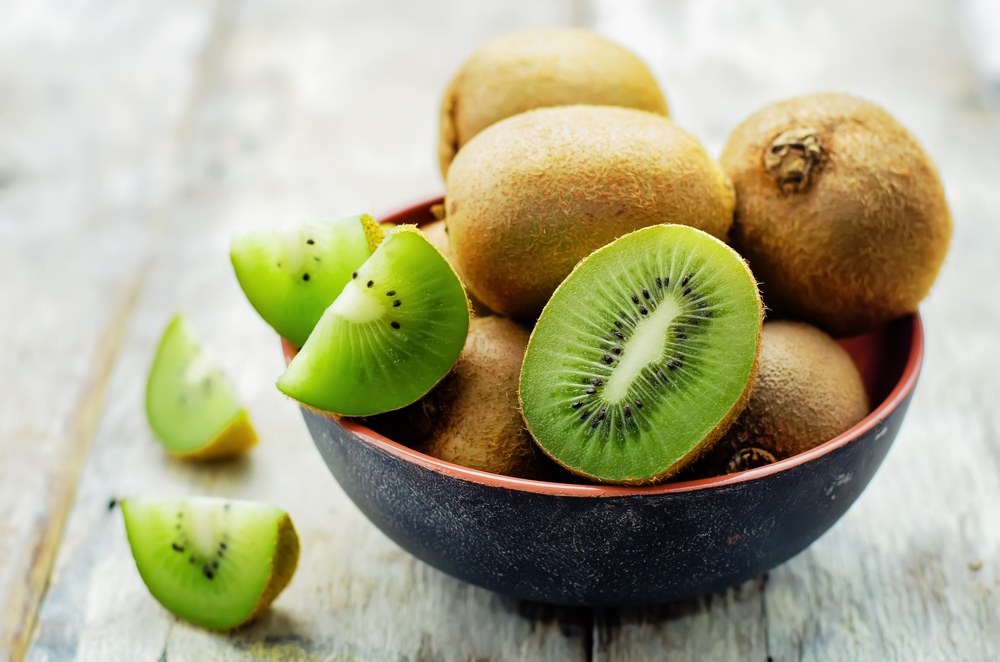Top 9 Best Foods and Drinks That Help You Sleep Better

Kiwi
Exotic, flavored and sleep-inducing – who wouldn’t want to enjoy kiwis?
First of all, this colorful fruit is extremely low in calories so it fits most diets out there. More precisely, a single kiwi contains 42 calories while being packed with valuable nutrients including 71% of your recommended daily intake (RDI) for vitamin C. Furthermore, the green fruit is surprisingly rich in vitamin K, folate and potassium.
Studies from the Canadian Journal of Physiology and Pharmacology also claim that kiwi improves digestive functions, reduces inflammation and may even lower cholesterol levels (thank you, antioxidants!).
Need any more reason to enjoy kiwi before bed? They also help you sleep better.
This 4-week study involved 24 adults who had to consume two kiwifruits one hour before going to sleep every day. By the end of the trial period, all participants reported falling asleep 42% more quickly than before consuming the fruit. Furthermore, their total sleep time increased by 13% while reducing their nighttime waking by 5%.
All of these positive effects are due to serotonin. Also called the ‘feel-good hormone,’ this brain chemical is crucial for regulating your internal clock and helping you sleep more and better.
Fatty fish
Turkey may be delicious, but we can’t eat it every day just to sleep better, right?
One of the best alternatives that offers a similar effect are fatty fish such as tuna, salmon, trout or mackerel. The one thing they have in common? Vitamin D.
Just a 3-ounce (85 grams) serving of salmon contains 570 IU (International Units) of vitamin D, which is 71% of your Daily Value (DV). Similarly, one serving of farmed rainbow trout provides you with 81% of your DV.
Fatty fish are also among the best sources of omega-3 fatty acids, particularly eicosapentaenoic acid (EPA) and docosahexaenoic acid (DHA). Both of these acids are known for reducing inflammation and preventing the long-term risks for heart disease.
Both Vitamin D and omega-3 fatty acids boost the production of serotonin; as we already know, this hormone is crucial in order to sleep better and reduce the risks for insomnia.
During this study, participants who ate 10.5 ounces (300 grams) of Atlantic salmon three days a week for 6 months reported falling asleep 10 minutes faster than those who ate other types of meat. Researchers believe that these positive results are brought by vitamin D, an essential micronutrient for improving sleep quality.
Looking for more info on vitamin D? You can check out my post on Why Vitamin D Could Be The Holy Grail of Immunity right here.
Passionflower tea
Now back to healthy beverages: passionflower is a herb long used for treating and preventing many illnesses and infections.
First of all, it’s an extraordinary source of flavonoid antioxidants. As I mentioned earlier, this group is renowned for reducing inflammation, reducing health disease risks and boosting your immunity.
Secondly, drinking passionfruit tea can reduce anxiety due to its high amount of apigenin – an antioxidant that binds to brain receptors which can promote calmness.
Studies published in NeuroImage Clinic also proved that passionflower increases the production of gamma aminobutyric acid (GABA), a brain chemical that reduces stress and promotes sleepiness.
Other effective foods and drinks
Did you know that many of the foods and beverages you’re already consuming can improve your sleep quality? Here are some of the best options:
- Remember when our parents gave us a glass of milk every night before bed? That’s because dairy products are rich in tryptophan, which is known for helping you sleep better.
- This yellow fruit contains magnesium, which may regulate sleep schedule, while its peel is rich in tryptophan. You can use the peel to make tea and sweeten it with honey, another powerful source of antioxidants.
- Aside from offering satiety, oatmeal also contains considerable amounts of melatonin and fiber which improve sleep quality, prevent insomnia and keep you full until morning.
![]() What are you doing when you can’t fall asleep? Share your tips in the comment section and let’s keep our minds and bodies healthy!
What are you doing when you can’t fall asleep? Share your tips in the comment section and let’s keep our minds and bodies healthy!
